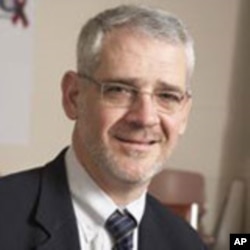The doctor who helped pioneer the “treatment as prevention” approach in the fight against HIV/AIDS will receive the Albert Einstein World Award of Science. Dr. Julio Montaner chaired the 18th International AIDS Conference in Vienna last July.
The former president of the International AIDS Society is director of the BC (British Columbia) Center for Excellence in HIV/AIDS in Vancouver, Canada.
Montaner says he and others began promoting expanded treatment about 10 years ago as a means of slowing the epidemic. He says it’s gratifying to see the concept of “treatment as prevention” so widely accepted today.
“A lot of people were interested in the potential role that treatment could have on both achieving better outcomes for people infected with HIV, but secondarily, decreasing their infectiveness,” he says.
Unfounded fear
Some initially raised concern, saying if HIV positive people believed they were less likely to infect others, they might be more likely to engage in risky behavior. For example, unprotected sex.
“What happened then,” he says, “was that we were able to show that the effect of treatment on decreasing HIV infectiveness is actually quite dramatic – pretty much in excess of 90 percent decrease in transmission. By no means were we trying to advocate that people could just treat their way out of the epidemic. What we’re saying is that the fear that overcompensation will negate this absolutely with any amount of risk compensation on the part of those infected with HIV is just not panning out to be the case.”
With no cure or vaccine available for HIV/AIDS, world leaders and health officials have pledged to provide broader access to treatment. Montaner says that had major, but unexpected, beneficial effects.
“Your promise to bring treatment to the people was a fair one, was a compassionate one, was an important one. But in addition, without even knowing, you actually were on the right track to control, to curb, to decrease and to hopefully even extinguish the epidemic one day. Look at the data. By treating people, you’re subtracting the pool of donors from the community. And so, the more you treat, the more you reduce transmission. So you made treatment actually part of the solution. You made treatment part of the end game,” he says.
He says the knowledge exists to transform HIV/AIDS from a raging pandemic to perhaps a manageable, more endemic, disease.
Treating people infected with HIV much earlier, long before the immune system collapses, has become more widely accepted. It’s based on the number of CD4 immune cells in the blood.
But that decision has social, economic and political considerations, not just health concerns.
“I think it would be ethically problematic,” he says, “for me and for other people working in this area, if all of a sudden we were going to divert resources to treat people who have high viral loads, for example, because they are more infectious, at the expense of not treating people who have maybe lower viral loads, but lower CD4s, and therefore are at a higher risk of immediate disease. What I’m trying to say is we need to be sensible and approach this one stage at a time, combining the competing priorities of both the individuals in need and controlling the epidemic.”
Dr. Montaner says as more people realize that expanding treatment saves money in the long run, “treatment as prevention” will be given even higher priority. It’s already a central part of UNAIDS strategy on the pandemic called Treatment 2.0.
“We won’t really complete the picture until we have both a cure and a vaccine. And you know, one or the other would be very welcome. The reality is we cannot promise a timeline for those developments,” he says.
Nevertheless, he says, the tools exist to dramatically curb the pandemic. Montaner says “treatment as prevention” has had great success in British Columbia, citing a decrease of up to 70 percent in new HIV infections.
Montaner will receive the Albert Einstein World Award of Science December 8th in Mexico.













